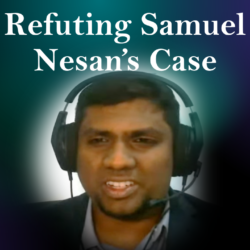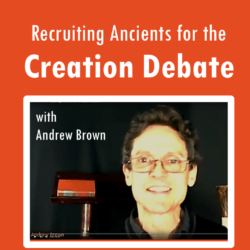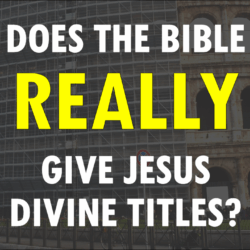In this episode we tackle the next chunk of Michael Brown’s opening statement in the recent Trinity debate. We address his argument that since God’s words remain forever and Christ’s words remain forever, they must be the same (cf. Mat 24.35 vs. Isaiah 40.7-8). Next we briefly explain the grammatical issues related to Titus 2.13 and the alleged Granville Sharp Rule. Then we discuss Brown’s case for Jesus as the eternal, uncreator, creator of the cosmos (John 1, 1 Cor 8.6, and Col 1).
To help you follow along, here is the relevant portion of the manuscript Brown used for his opening statement:
That’s why in the Old Testament, Yahweh’s words remain forever (Isa 40:7-8) but in the New Testament it is Jesus’ words that will remain forever (Matt 24:35).
The Lord declared in Isaiah 43:11, “I, I am the LORD, and besides me there is no savior,” yet throughout the New Testament, Jesus is hailed as our Savior. Either He is one with God, or there is more than one true savior. Paul leaves us no doubt, referring to “our great God and Savior Jesus Christ” in Titus 2:13. That’s the most obvious and clear sense of the Greek. Jesus is our great God and Savior.
We also learn from this same section in Isaiah that when Yahweh created the universe, He did it alone. As written in Isaiah 44:24, “I am the LORD, who made all things, who alone stretched out the heavens, who spread out the earth by myself.” Yet the New Testament tells us explicitly that the Son was involved in creation.
In John 1:1, John uses the language of Genesis 1:1 in the Septuagint, saying that the Word was in the beginning (en arche), and explaining that what God was, the Word was. And, he continues, “All things were made through him, and without him was not any thing made that was made. In him was life, and the life was the light of men” (John 1:3-4). And, John tells us, it is this preexistent Word, this Word through which all things were created, which became flesh and dwelt among us (John 1:14).
And that’s why John the Immerser explained that Jesus “ranks before me, because he was before me” (John 1:30). That’s why Jesus said that He was from above, that He came down from heaven, that He came from God and was returning to God (John 3:13; 6:38, 41; 8:23; 13:3).
That’s why Paul wrote in 1 Corinthians 8:6, “yet for us there is one God, the Father, from whom are all things and for whom we exist, and one Lord, Jesus Christ, through whom are all things and through whom we exist.” Even more emphatically, he wrote, “For by him [meaning the Son!] all things were created, in heaven and on earth, visible and invisible, whether thrones or dominions or rulers or authorities– all things were created through him and for him. And he is before all things, and in him all things hold together” (Col. 1:16-17).
The text is clear. The Son is eternal. The Son is uncreated. All things were created through Him and for Him.
You really have to engage in a hopeless series of exegetical gymnastics to deny the plain sense of these words. And remember: In Isaiah, Yahweh said no one was with Him when He created the universe, yet these texts say He created all things through His Son. That can only mean one thing: The Father and Son are one God! And that’s why Jesus explained that it was His Father’s will “that all may honor the Son, just as they honor the Father” (John 5:23).
—— Links ——
- For a more extensive treatment of John 1.1, see Podcast 111 with John Schoenheit
- You can find the other episodes in this series on Refuting Brown’s Opening Statement here
- You can listen to the entire debate on podcast 158 or watch it on YouTube
- Check out post debate interviews with Michael Brown and Dale Tuggy
- Also see, Bill Schlegel’s 4 part series on explanations of misunderstood texts about Jesus
- For a written examination of Hebrews 1.8 and John 20.28 in light of the principle of agency, see Explanations to Verses Commonly Used to Teach that Jesus Is God
- Intro music: Jazzy Frenchy by bensound.com. Licensed under Creative Commons: By Attribution 3.0 License.







I do think there should be more discussion concerning the issue of the significance of whether Lord Jesus was “created” vs “born”. There are some Unitarians, who have you-tube channels that do make a case for significance for this distinction. As far as I know, I don’t know of any group that is denying His birth. Since, our Lord was the Firstborn from God and from the dead; If there is a valid significance, then this would take away some ammunition from the umbrella term – “mere man”, that is used against a Unitarian Christology. I haven’t thought about this enough to make a solid confession; but I am absolutely confident in Our Lord’s own words (every word of God); concerning Himself. The Greek word “‘monogene(s)” definitely implies a generation of our Lord’s existence: which I believe are rooted in God Himself, as the Father and the Logos. It is just logical to conclude that the Logos both makes God, a Father…… and the Son, a son, at the same time. We are not fathers until we have a son(s). However, in God’s unique position as the Lord God, He alone speaks (the Logos) …and it is done, as if it already was, according to His everlasting will and power. I do believe the Lord Jesus, came from heaven, as the Logos, was clearly from heaven, and sent to earth; and He was anointed by God, from heaven on earth, and returned to heaven. But, I don’t need to believe in “The Deity of Christ” to believe these Biblical texts.
This makes for great color commentator for anyone watching the Debate. 😉
You may be aware, there has been a ‘vigourous’ debate (shall we say) over the meaning of ‘monogenes’ in the evangelical world, for a few decades now, and the dust hasn’t settled yet.
The doctrine of ‘eternal generation’ (EG) hinges partly (but importantly) on how John uses this word. The one thing I’ve noticed about this debate is that many commentators never clearly state that the Father-Son ‘generation’ (begotten) is explained (ultimately) only by analogy – there is an inherent limitation in the use of language here (but this critical point usually gets lost).
Each of the ways to interpret ‘monogenes’ in John – metaphorical/metaphysical/literal – also has particular limitations. This may be obvious to many, but when you go through some of the back-&-forth blogging on this matter it is not. One prime example of the inherent limitation of logic arguments for this can be seen in an article by Lee Irons – “…the Son derives the divine attribute of inderivity (aseity) from the Father!’. But apparently thats ok because “derive is being used in two different senses….”. Yes, Irons further clarifies this (somewhat) but then says that ‘Even if a residual feeling of discomfort remains, I can’t see any other way of reconciling the two doctrines of eternal generation and the autotheotes of the Son’. (He is honest enough to admit this; https://www.upper-register.com/papers/monogenes.html). [I choose this as a typical example]
Another thorny problem: EG requires that God, as part of his essence, ‘necessarily’ generates the Son – So if the Son has the same essence then necessarily he must also ‘generate’ a son,…. and so on ad infinitum. To answer this problem trinitarians devised a ‘stopping rule’: that the Father only ‘needs’ one Son. OK, it stops the infinite process, BUT its purely an arbitrary rule – there is nothing logically that demands this to be so. Yes, the whole thing could devolve into a convoluted debate but… is that necessary (!).
(Dale Tuggy has a podcast in which Richard Swinburne talks about this: https://trinities.org/blog/podcast-231-swinburnes-social-theory-of-the-trinity/).
Its interesting that some accept the ‘eternal sonship’ of Christ but not eternal generation.
It was after Origen, I think, that there was a turning point for EG. Origen seems to have retained the ‘word’ as Wisdom (wrote plenty about that), he appears to have gone up to the limit of, but never actually equated, the ‘word’ with a literal preexisting hypostasis – it was Athanasius that really pushed it over the line & made the full equation (& O was subsequently deemed ‘heretical’ in certain doctrines including the preexistence of souls).
But positively, there seems to be a lot we could instead glean about ‘preexistence’ & how it was understood in the ‘wisdom’ literature of the time, e.g. the book of Wisdom (of Solomon), esp. the middle chapters of that work which strongly personify wisdom while staying just this side of literalism. There are several other works of the time addressing Wisdom of course. Its a fine line though and could easily get blurred. So Its nice to see some others (eg Dustin Smith) recovering some of the original understandings of these concepts that have been undervalued in current debates.
I believe you’re right “God’s word in John 1 is about God in action” is more on point than what I had commented on the “Michael Brown interview” podcast page where I said “I believe the most accurate term is “revelation” because by definition it is God’s disclosure of Himself and His will to His creatures.”
Sean, thank you for enlightening me on this! Further on this note, when God expresses himself he’s not doing it towards any gods for he’s the only one. Can we say that God’s word is His expression towards creation? Is his word therefore His love for creation in John 1:1 and His love became flesh in Jesus Christ (John 1:14, 3:16)?
It makes sense to me with what you pointed to in Psalm 33:6,9
“By the word of Yahweh, the heavens were made;
Yes, by the breath of his mouth, all their armies.
…
For he spoke, and it was done.
He commanded, and it stood firm.”
Just some thoughts, I have much I want to learn!
🙂
“I’d like to thank my dad and mom Nancy.” Dr. Brown would have to say that my mom and dad are the same person. This is not difficult to understand.
You guys have some great discussion going here!
I was very interested in what you had to say about Colossians 1:16 and ta panta.
To play devil’s advocate with this verse, could I ask about a different view I have heard?
That is that Paul was writing the Colossian epistle to address various religious practice problems – including angel worship. As you pointed out, Colossians 1:16 lists orders or categories of angels.
I have heard some say that Paul was writing about how Jesus (the Logos) was the agent for original creation and specifically lists the orders of angels, not to show that Jesus has re-ordered them, but to point out to his hearers that they should be worshipping Jesus the creator over any level of created angel.
It is this reason why he chooses to list things in the invisible realm and doesn’t take the time to list out earthly things like trees, and birds, and fish.
What’s your opinion?
Also, you raised the point that, if Jesus were Almighty God, he wouldn’t be saying he could do nothing on his own. What’s your take on John 16:13 where it says that even God’s own Holy Spirit, “will not speak on his own, he will speak only what he hears”? Thanks!
Matt, my personal opinion is that the thrones, powers, and authorities are both seen and unseen – that is, in heaven or on earth. I take it that the heavenly things just are the unseen (not invisible as in not able to be perceived with vision), and the earthly things just are the seen. So, when Paul talks about spiritual rulers of wickedness in high places, these would be unseen archons. However, those that are created in Jesus are not wicked, but good. The overcoming of the world in Jesus is what we are doing in that we are fighting against this wickedness, and so I think that these are indeed not the rulers that are made in him.
Again, that’s just my personal opinion…
Great podcast. I am grateful for you guys for critiquing Dr. Michael Brown from the debate. His accusations need to be answered and addressed. And he needs to ease up on the accusations. Why not go in-depth with the verses you claim to show The Messiah as deity Dr. Brown? Instead of using most of your time accusing your opponents of blasphemy for believing that the Father is the only true God. Brown seems to borrow Saballianism, Modalism, and Trinitarainism when it best suits him. He is not only a trinitarian, but at some points he inadvertently makes the Messiah both Father and son and creator. He uses multiple heresies to justify Trinitarianism. And he seems to be very catholic in his faith. By believing in the trinity, he agrees to the councils that made this philosophy and argument for him to use centuries later. His whole mindset is Catholic when it comes to the trinity. He, and Trinitarians, are blaspheming God the Father by calling other beings “God”, and yet they believe in 1 God. He would also agree that in Genesis, “Elohim”, like many have argued, is plural, saying “In the beginning, Gods made the heavens and earth”. And they call themselves monotheists. The world knows that this is not monotheism when you claim that “Gods made the heavens and the earth”. Great job Sean. Keep up the good work.
Sean and Jerry: What do you make of Brown’s reference to a single throne, in Revelation 22:1 & 3 – the throne of God and the lamb? Also, related to this, what is this single name thing with Matthew 28:19, when referring to two individuals and also the Spirit of God? I think you are doing a wonderful job. I am a strict monotheist, now, for about 14 years( I prefer that phrase to “”biblical unitarian.”). And I am near age 64! My question might be answered similarly to the inconsistency of the so-called “Granville-Sharpe” rule (Greek and English apparently having different norms). But I was just wondering, grammatically speaking, the purpose of using the single noun when plural entities are referenced. Father, Son and holy spirit, I can comprehend, though I do not know if it works grammatically, since the Son(a person) and the holy spirit both come in the name of God – YHWH. But I don’t understand this “single throne” in Revelation 22. I know earlier that it has two thrones and that Jesus is a separate individual from the Father. But is there a grammatical rule that explains “the name” and “the throne.” Does it differ a bit from English? I suspect that it does. But could use some confirmation as to the rule differing from English grammar.
Thanks for sharing all of this – looking forward to converge
Look forward to Dr. Brown’s response:
https://youtu.be/Ml41WLADjMU
Sean, isn’t the Son of Man described as such in contrast with the beasts? As such, it’s one that’s made in the image of God, or one that is like God, in contrast to the beasts.
Throughout the Old Testament, you have this kind of figure going on, based on the Genesis account. So, you have in Nebuchadnezzar, him being a lion that is given the heart of a man when he has his reason return and knows that God is the One that gives the kingdom. In Jonah, you have the Ninevites, who do not know their right hand from their left — and many animals. With David, he approaches Goliath like a dog, where he is an “uncircumcised Philistine”, where the circumcision that we know of that is inward is one that has God’s law inwardly. “By his knowledge shall My righteous servant justify many”.
I think that, like you said, there are a lot of things that can be said about each of these passages. I think that it’s good to get into the very intricate details as to how these things each mean what they mean. So for instance, that the Son of Man is the Son of Man pertains to him being in the image of God, or being like God, in that he knows God’s will. Between Genesis 2 and 3, it pertains to the knowledge of good and evil, but in reference to Jesus, it is understanding what the Father had been saying in the Old Testament, having the knowledge of God in that way in particular.
You may notice that a lot of people are convinced with shallow arguments and, because there is no real knowledge, the imagination fills in the gaps. That can work for learning, but a person should know that they’re not quite there yet. When you have a firm grasp on everything pertaining to these things, I think it gives more confidence and assurance regarding them. So, I do indeed think it is good to go into these things in a detailed way.
If you’d like, I can shoot some detailed stuff your way and bounce it off of you.
In either case, thanks again, and take care!
-Jon
Excellent presentation. Well done, both of you. The explanation of Colossians 1 was very clear. (Jerry sounds a bit like Christopher Walken. Is he Victor Paul’s grandson?)